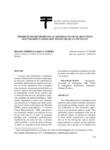Mostrar o rexistro simple do ítem
Prediçâo do rendimento académico no final do ensino secundário na base dos testes de QI na infância
| dc.contributor.author | Pereira, Marcelino | |
| dc.contributor.author | Almeida, Leandro S. | |
| dc.date.accessioned | 2011-11-18T12:39:39Z | |
| dc.date.available | 2011-11-18T12:39:39Z | |
| dc.date.issued | 2010 | |
| dc.identifier.citation | Revista galego-portuguesa de psicoloxía e educación, 2010, 18/1: 239-249. ISSN: 1138-1663 | es_ES |
| dc.identifier.issn | 1138-1663 | |
| dc.identifier.uri | http://hdl.handle.net/2183/8405 | |
| dc.description.abstract | [Resumo] A relação entre inteligência e rendimento escolar é normalmente assumida na psicologia da educação, mantendo-se tais coeficientes de correlação estatisticamente significativos mesmo em níveis académicos mais avançados. Esta correlação, interpretada no sentido de um efectivo impacto das capacidades intelectuais no desempenho escolar futuro, justifica aliás a utilização dos testes de inteligência nalgumas situações da prática psicológica. Neste estudo longitudinal e tendo como referência uma amostra de 74 crianças, que foram avaliadas com a Escala de Inteligência de Wechsler (WISC) quando frequentavam o 1º Ciclo do Ensino Básico (Pereira, 1998), analisamos a sua trajectória escolar num intervalo de tempo que varia entre 8 e 11 anos. Os resultados apontam para correlações estatisticamente significativas, em particular com a subescala verbal da WISC e o teste de factor g (Raven). A análise de regressão permite associar 20% da variância no rendimento académico no final do ensino secundário aos valores no QI verbal e ao factor g. | |
| dc.description.abstract | [Abstract] The relationship between intelligence and academic achievement is normally assumed in educational psychology research, and correlation coefficients are still statistically significant at more advanced academic grades. This correlation, which is interpreted in the way of an effective impact of intellectual capacities in future school classifications, can explain the use of the intelligence tests in psychological practice at schools. In this longitudinal study, with a sample of 74 children who have been evaluated by Wechsler Intelligence Scale (WISC) during their frequency of 1rst Cycle of Basic Education (Pereira, 1998), we analyze the correlations between intelligence tests and academic classifications at the end of Secondary Education, before accessing Higher Education (an interval between 8 and 11 years). Results suggest significant correlations coefficients, namely if we consider WISC verbal subtests and g factor(Raven). The regression analysis permits to consider that 20% of variance in academic achievement at the end of secondary school can be explained by the results on IQ verbal and g factor tests. | |
| dc.language.iso | glg | es_ES |
| dc.publisher | Universidade da Coruña | es_ES |
| dc.subject | Inteligência | es_ES |
| dc.subject | Quociente de inteligência | es_ES |
| dc.subject | Testes de intelligência | es_ES |
| dc.subject | Rendimento académico | es_ES |
| dc.subject | Validade preditiva | es_ES |
| dc.subject | Intelligence | es_ES |
| dc.subject | Intelligence quotient | es_ES |
| dc.subject | Intelligence tests | es_ES |
| dc.subject | Academic achievement | es_ES |
| dc.subject | Predictive validity | es_ES |
| dc.title | Prediçâo do rendimento académico no final do ensino secundário na base dos testes de QI na infância | es_ES |
| dc.type | info:eu-repo/semantics/article | es_ES |
| dc.rights.access | info:eu-repo/semantics/openAccess |






